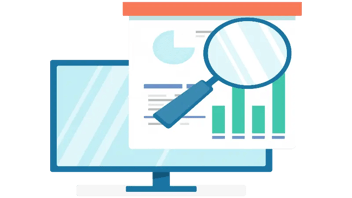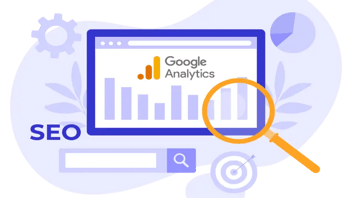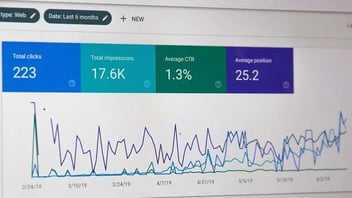Unlock SEO success: Learn how we use HubSpot Content Hub for SEO, boost rankings, increase organic traffic, and optimize our content for success.
SEO - Traffic Sources: What is Organic Search?
Web traffic is the lifeblood of online success. Among the various sources of this invaluable traffic, organic search stands out as a beacon of opportunity for modern businesses. Here to guide you through digital marketing success, this blog will shed light on organic search and why it's crucial for your business.

What is Organic Search?
Organic search, simply put, is the process by which internet users find your website through search engines without any direct monetary exchange involved. Unlike paid advertising, where businesses pay for placements, organic search results are earned through the relevance and quality of your website's content. Essentially, organic search is the driving force behind inbound marketing.
- Organic search is the largest source of website traffic, accounting for over 50% of all visits.
- According to Google, there are over 5.6 billion searches every day.
-
Organic search traffic has a conversion rate of over 15%, which is higher than the conversion rate for other traffic sources, such as social media and paid advertising.
At the core of organic search lies the power of search engines. Internet users often turn to these digital gateways, such as Google, Bing, or Yahoo, to find answers to their questions and solutions to their problems. This allows businesses to connect with potential customers actively seeking their products or services.
User behavior plays a pivotal role in organic search. When individuals need information, they instinctively turn to their favorite search engine. Whether they're seeking a local restaurant, the latest tech gadget, or solutions to everyday problems, search engines are the go-to resource. Understanding this behavior is the key to unlocking the potential of organic search for your business.
One of the most compelling aspects of organic search is the vast audience it brings to your virtual doorstep. Billions of searches occur daily, and each presents an opportunity for your website to be discovered by potential customers. The reach and influence of search engines are unparalleled, making them an essential channel for businesses looking to expand their online presence.
The Power of Search Engines
Search engines are the gatekeepers of information in the digital age. Understanding the power of search engines is fundamental to appreciating the significance of organic search in the modern business landscape.
Search engines like Google, Bing, and Yahoo have become the trusted digital compass for billions of people worldwide. They wield incredible influence by providing a structured and efficient means of navigating the vast expanse of the internet. Users have come to rely on these platforms to direct them to relevant websites, and this reliance creates an invaluable opportunity for businesses.
At the core of this power is user behavior. When an individual seeks information, they instinctively turn to their preferred search engine. It's a reflex action deeply ingrained in the modern psyche. This behavior underpins the potential of organic search, as it connects businesses with users actively seeking their products or services.
For businesses, search engines offer a dual advantage: discoverability and accessibility. They serve as the primary channel through which potential customers find what they're looking for. By optimizing your online presence for organic search, you increase the likelihood of your website appearing at the top of relevant search results. This translates to greater discoverability and a heightened chance of attracting valuable organic traffic.
Benefits of Organic Search Traffic
Long-Term Sustainability
One of the most compelling benefits of organic search traffic is its sustainability. Unlike paid advertising, which stops delivering results the moment you cease funding it, organic search traffic provides lasting value. When you've earned a high-ranking position on search engine result pages (SERPs), you can enjoy a steady stream of visitors over an extended period.
Cost-Effective Marketing
While paid advertising can quickly drain your marketing budget, organic search traffic is incredibly cost-effective. Once you've invested in the right strategies and established a strong online presence, the ongoing costs are relatively low. This means you can achieve a remarkable return on investment (ROI) over time, making it a preferred choice for businesses of all sizes.
Trust and Credibility
Websites that consistently rank high in organic search results are viewed as authoritative and trustworthy by users. Achieving and maintaining a top position signals to potential customers that your business is reliable and relevant in your industry. This trust can lead to increased brand loyalty and conversions, as users are more likely to engage with and purchase from businesses they perceive as reputable.
Quality Traffic
Organic search traffic is unique in that it attracts users who are actively seeking the products or services your business offers. These visitors often have a genuine interest in what you provide, which leads to higher-quality leads and potential customers. This targeted traffic is more likely to convert, improving sales and business growth.
You might also like:
The Anatomy of Organic Search
Components of a Search Engine Result Page (SERP)
The first layer of organic search is the Search Engine Result Page, or SERP. When a user enters a query, the search engine returns a list of results. On a typical SERP, you'll find a combination of organic listings and paid advertisements. Organic listings are the unpaid results that search engines deem most relevant to the user's query. They're a testament to your website's authority, relevance, and optimization.
The Role of Keywords
Keywords are the bedrock of organic search. These are the specific words or phrases that users input into search engines. Search engines use complex algorithms to match these keywords with the content on your website. The more closely your content aligns with the user's query, the better your chances of ranking higher in organic search results.
On-Page and Off-Page SEO
Two fundamental factors influence your organic search rankings: on-page and off-page SEO. On-page SEO pertains to the elements within your website, including the content, meta tags, header tags, and site structure. Effective on-page SEO ensures that search engines can easily understand and index your website's content.
On the other hand, off-page SEO focuses on external factors that influence your website's ranking. This includes backlinks from authoritative websites, social signals, and online mentions. Building a strong off-page SEO strategy is crucial for demonstrating your website's trustworthiness and relevance.
Organic Search and SEO
SEO (Search Engine Optimization) underpins the world of organic search. To succeed in organic search, it's crucial to understand the rules and strategies of this practice.
Content is King
In the SEO game, content reigns supreme. Your website's content is the primary way search engines assess its relevance to user queries. Crafting high-quality, informative, and engaging content that caters to the needs of your target audience is a foundational strategy. By providing valuable information and solving user problems, you enhance your website's authority and trustworthiness in the eyes of both search engines and users.
Keywords: The Foundation of SEO
Keywords are the game pieces in SEO. They are the specific terms and phrases that users enter into search engines to find information. Incorporating relevant keywords into your content, meta tags, and headers is essential for signaling to search engines that your content addresses users' queries. Effective keyword research and usage can significantly impact your website's ranking.
Backlinks and Authority
Building a network of high-quality backlinks is akin to amassing a valuable collection of assets. Backlinks are links from other websites to yours, seen as endorsements of your content's credibility. The more authoritative and trustworthy the linking sites are, the more they boost your website's reputation in the eyes of search engines.
User Experience (UX) and Site Structure
User experience and site structure are vital elements of SEO. A well-organized website that is easy to navigate enhances user satisfaction and improves search engine rankings. A clean, mobile-responsive design, fast page loading times, and an intuitive navigation system are essential aspects of the user experience.
Effective SEO requires a constant state of evolution. Search engines regularly update their algorithms to provide users with better results. This dynamic environment means staying ahead of the game requires continuous learning and adaptation. Keeping up with the latest SEO trends, best practices, and algorithm updates is essential to maintaining and improving your website's organic search performance.
Achieving Organic Search Success
Achieving success in organic search requires a thoughtful and multifaceted approach. Here are some key strategies to help businesses of all sizes and niches climb the ranks on search engine result pages and maximize their organic search potential.
-
Comprehensive keyword research: Start by identifying the keywords and phrases relevant to your business and industry. Tools like Google Keyword Planner, SEMrush, and Ahrefs can help you discover high-potential keywords with decent search volumes and manageable competition. Remember to focus on long-tail keywords, too, as they often represent highly specific user queries.
-
High-quality, user-centric content: Creating high-quality, user-centric content is paramount in the SEO game. Content should not only be optimized for keywords but should also be informative, and engaging, and directly address the needs and questions of your target audience. Regularly update your content to keep it fresh and relevant, which search engines favor.
-
On-page SEO optimization: Optimize your on-page elements, including meta titles, meta descriptions, header tags, and alt tags for images. Ensure that these elements align with your target keywords and provide a clear and accurate representation of your content.
-
Mobile optimization: Given the proliferation of mobile device usage, it's crucial to have a mobile-friendly website. Google now prioritizes mobile-first indexing, making mobile optimization not just a nice-to-have but a necessity for maintaining and improving your search rankings.
-
Backlink building: Backlinks from authoritative and relevant websites signal to search engines that your content is credible and valuable. Focus on ethical link building with a network of high-quality backlinks through strategies like guest blogging, outreach, and content marketing.
-
Technical SEO: Address technical aspects of your website, including page load times, site speed, structured data, and schema markup. A technically sound website enhances the user experience and pleases search engine algorithms.
-
Consistent monitoring and application: The digital landscape evolves constantly, and so should your organic search strategy. Regularly monitor your performance using tools like Google Analytics and adjust your tactics based on the data. Stay updated with the latest SEO trends and algorithm changes to maintain your competitive edge.
-
Content promotion and social signals: Promote your content through social media channels, email marketing and other content distribution methods. The signals generated from these promotions can positively influence your organic search rankings.
Measuring Organic Search Performance
Understanding how well your strategies are working not only allows you to track progress but also offers insights into how you can improve and refine your approach.
Key Performance Indicators (KPIs)
-
Organic traffic: The most basic KPI is the amount of organic traffic your website receives. This metric measures how many users find your site through organic search.
-
Keyword rankings: Tracking the positions of your targeted keywords in search results is crucial. Improved rankings signify your SEO efforts are paying off.
-
Click-through rate (CTR): The organic click-through rate measures the percentage of users who click on your link after seeing it in search results. A high CTR indicates that your content is engaging and relevant to users.
-
Bounce rate: Bounce rate tracks the percentage of users who leave your site after viewing only one page. A lower bounce rate indicates your content is captivating and encourages users to explore your site further.
-
Conversion rate: Ultimately, conversions are what drive your business. Whether it's a sale, lead generation, or any other desired action, tracking conversion rates helps you understand the effectiveness of your organic search strategy.
-
Page load time: The speed at which your web pages load can significantly impact user experience and, consequently, your organic search performance. Faster-loading pages are favored by both users and search engines.
Measuring Tools
-
Google Analytics: A powerful and free tool, Google Analytics provides in-depth insights into your website's performance and website traffic categories, including organic traffic, user behavior, and conversions.
-
Google Search Console: This tool offers essential information about your site's presence in Google's search results. It helps you identify which organic keywords lead users to your site and highlights any potential issues.
-
SEMrush: SEMrush is a comprehensive SEO tool that allows you to monitor your keyword rankings, track backlinks, and perform competitive analysis.
-
Moz: Moz offers an array of SEO tools, including Moz Pro and Moz Local, that can help you with keyword research, site auditing, and link analysis.
-
Ahrefs: Ahrefs is another robust SEO tool specializing in backlink analysis, keyword research, and competitive research.
Regularly assessing these KPIs and utilizing the appropriate tools can gain valuable insights into your organic search performance. With this knowledge, you can make informed decisions to refine and enhance your strategies, ultimately driving more organic traffic and achieving your business objectives.
Organic search is a dynamic force that can propel your business to new heights in the digital landscape. By understanding its nuances and implementing a strategic approach, you can tap into a sustainable source of high-quality traffic, enhance your brand's credibility, and ultimately drive growth.
This content is also available in:
- Deutsch: SEO - Traffic-Quellen: Was ist die organische Suche?
- Español: SEO - Fuentes de tráfico: ¿Qué es la búsqueda orgánica?
- Français: SEO - Sources de trafic : Qu'est-ce que la recherche organique ?
- Italiano: SEO - Fonti di traffico: Cos'è la ricerca organica?
- Română: SEO - Surse de trafic: Ce este căutarea organică?
- 简体中文: 搜索引擎优化 - 流量来源:什么是有机搜索?










Leave a Comment